Table of Contents[Hide][Show]
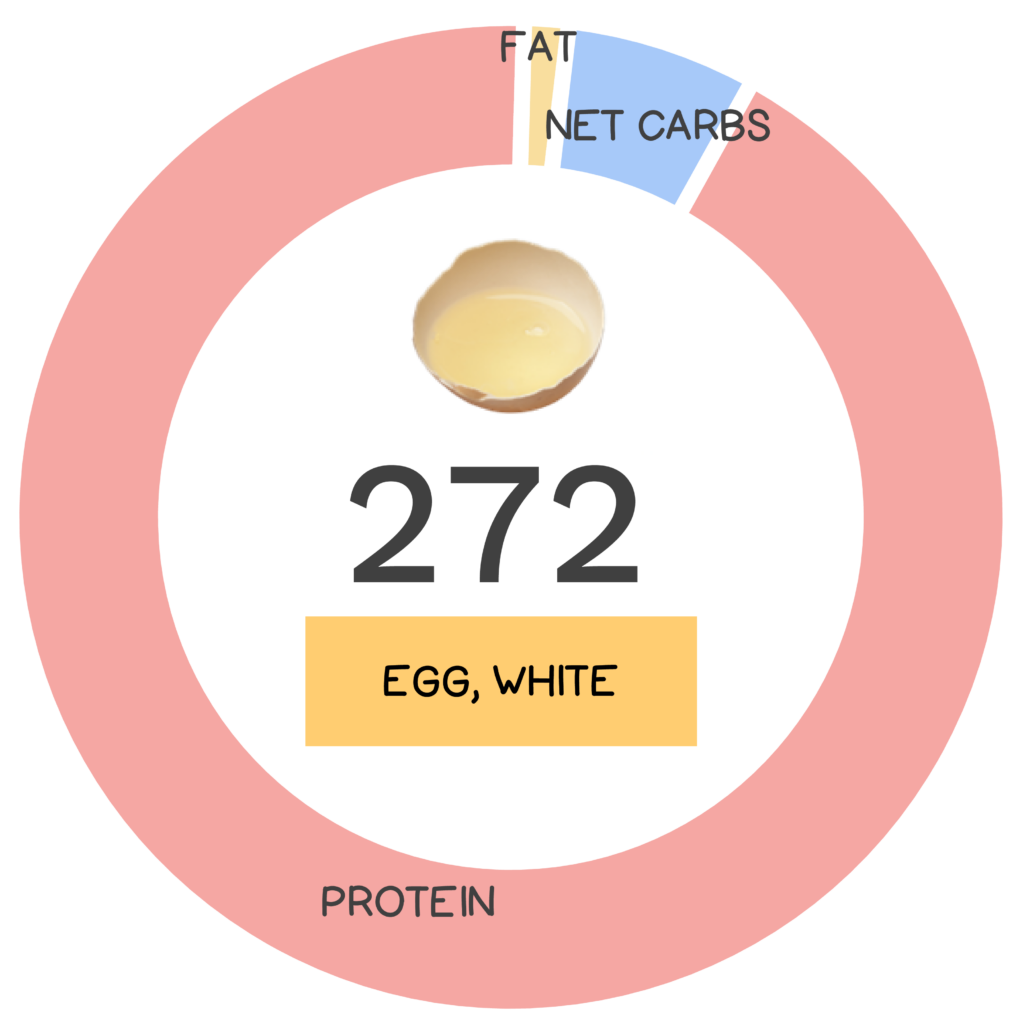
Synonymous with breakfast, whether you prefer them boiled, fried, over-easy, poached, scrambled, sunny side up, or in an omelet, frittata or quiche, eggs are the definition of versatility. A staple in most homes around the world, they are affordable, convenient, nutritious, and most importantly delicious!
Eggs have been a part of the human diet since before the dawn of agriculture and remain incredibly important across the globe today.
When we think of eggs, we’re generally referring to chicken eggs, but females from many species (including amphibians, birds, fish, reptiles, and even a few mammals) lay eggs. They have been part of the human diet since before the dawn of agriculture and remain incredibly important across the globe today. Even though eggs were harvested and consumed dating back to the prehistoric era, the chicken was only formally domesticated for consumption and egg production in Southeast Asia and India before 7500 BCE.
In addition to chicken eggs, duck, goose, guinea fowl, gull, ostrich, pelican, pheasant, quail, and turkey eggs are also enjoyed around the world.
Of course, chickens aren’t the only birds whose eggs are a valuable food source! Duck eggs, quail eggs, and goose eggs can all be found commercially (though sometimes it takes some searching!), and ostrich, turkey, pelican, pheasant, and gull eggs are sometimes eaten as a delicacy (with gull eggs being part of the traditional diet in many indigenous North American cultures, in England, and in Norway). Guinea fowl eggs are abundant at markets in some countries in Africa, as well as elsewhere in the world where they’re farmed. Guinea fowl eggs are much richer than chicken eggs, with a greater yolk-to-white ratio, while ostrich eggs are so large, they can serve about 24 for breakfast!
Despite all these options, when someone refers to eggs in a culinary sense, you can “eggs-psect” they mean chicken eggs. In the US alone, Americans consume an average of 281 chicken eggs per year! The chickens farmed primarily for eggs are called layer hens, with some breeds able to produce over 300 eggs per year! How “eggs-emplory” is that?
The color of the eggshell is not a reflection of its nutritional value or taste but varies according to species and breed – chickens with white ear lobes lay white eggs and those with red ear lobes lay brown eggs.
Each egg consists of a protective shell surrounding the egg white (albumen) and egg yolk (vitellus), the latter containing the vast majority of the egg’s nutrition. Contrary to popular belief, the color of the eggshell is not a reflection of its nutritional value or taste but varies according to species and breed. In general, chickens with white ear lobes lay white eggs, red ear lobes lay brown eggs, and those with bluish-green ear lobes produce bluish-green eggs, while the color of the yolk depends on the diet of the chicken. Speaking of, eggs can vary widely in nutrition depending on the hen’s diet and living conditions. At the grocery store you may encounter numerous options to ‘eggs-plore’ including cage-free, conventional, free-range, hormone free, omega-3, organic, pastured, and vegetarian fed (not necessarily something to strive for since chickens are omnivorous by nature). Eggs are also graded based on the size of the air cell within the egg, measured during candling. Smaller air cells mean fresher eggs and a rating of AA. With increasing air cell size and decreasing freshness, eggs receive lower grades such as A or B. In Canada and the United States eggs are washed before sale, which is why they need to be refrigerated, whereas unwashed intact eggs can be left unrefrigerated for months without spoiling, as is the case in many European countries. This is because eggs naturally contain a thin protective cuticle designed by nature to protect them from bacteria, which is removed with washing.
The first egg carton was invented in Canada in 1911 and was made out of paper.
And while eggs are important, also critical is their packaging! Though it might be hard to picture life without them now, the first egg carton didn’t appear until 1911, when a man named Joseph Coyle (from British Columbia, Canada) invented a hand-made paper holder to prevent eggs from breaking during shipment. An “eggs-straordinary” invention indeed! (Hyuck!)
Nutrivore Score for Chicken Egg White – 272
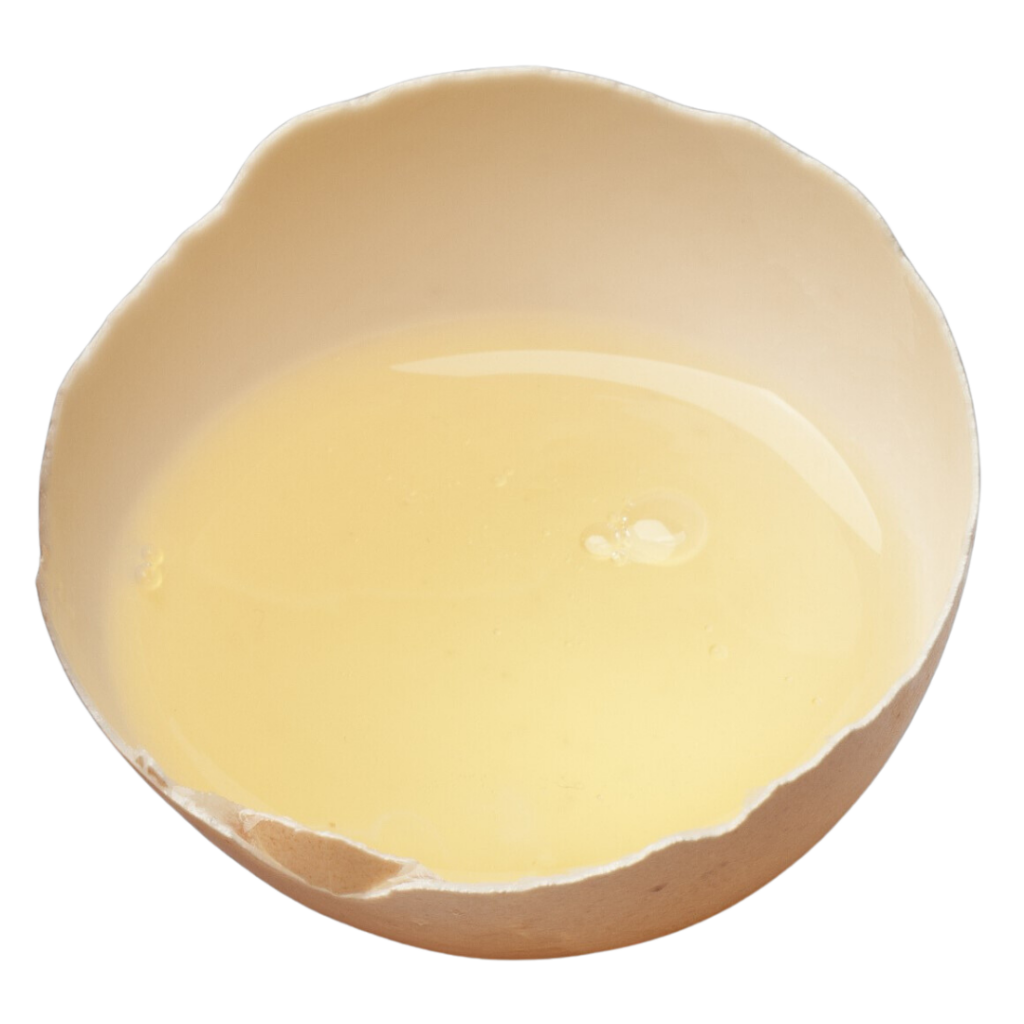
Chicken egg whites have a Nutrivore Score of 272, making them a medium nutrient-dense food! Plus, they are a low-carb and low-calorie density food; chicken egg whites contain 0.7 grams of net carbs and 52 calories per serving.
Per serving, chicken egg whites are an excellent source (20-50% daily value) of protein, selenium, vitamin B2 (riboflavin), and vitamin B7 (biotin).
Ditch Diets. Embrace Nutrients. Start with this FREE Guide.
Sign up for the free Nutrivore Newsletter, your weekly, science-backed guide to improving health through nutrient-rich foods — without dieting harder —and get the Beginner’s Guide to Nutrivore delivered straight to your inbox!

Chicken Egg White Nutrition Facts
One serving of chicken egg whites is standardized to 100 grams (3.5 ounces). To put this into perspective: one serving of chicken egg whites is approximately equivalent to that from 3 eggs. When you cook chicken egg whites, the volume remains relatively consistent.
Chicken Egg White Nutrition Facts Per Serving
| Chicken egg, white, raw | Nutrivore Score: 272 | Nutrient Density: Medium |
|---|---|---|
| Serving Size: 3 eggs (100 grams) | Protein: 10.9 grams | Net Carbohydrates: 0.7 grams |
| Calories: 52 | Total Fat: 0.2 grams | Dietary Fiber: 0.0 grams |
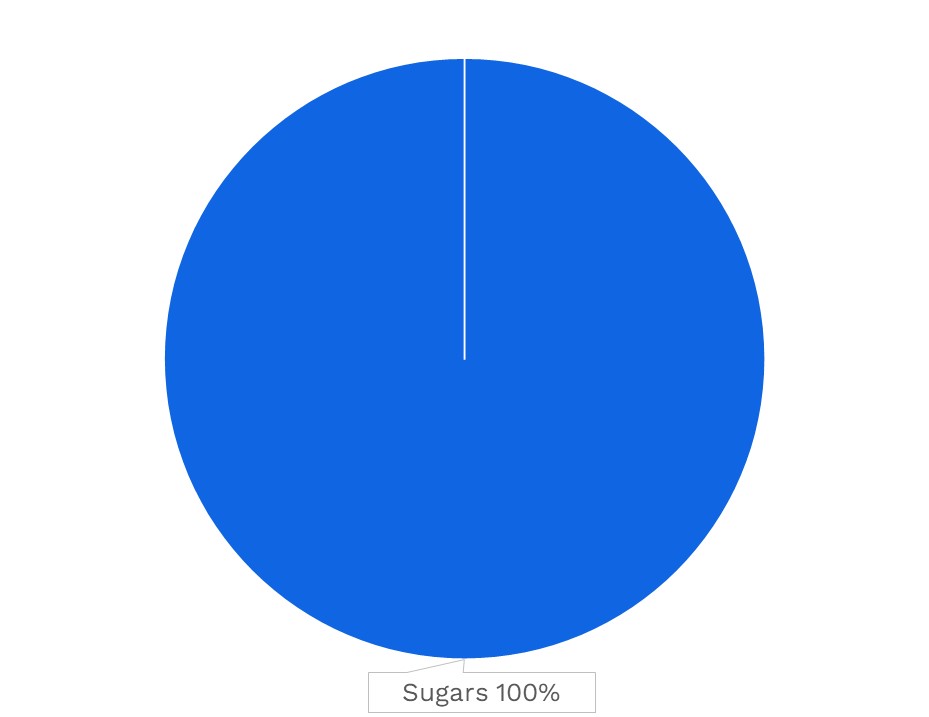
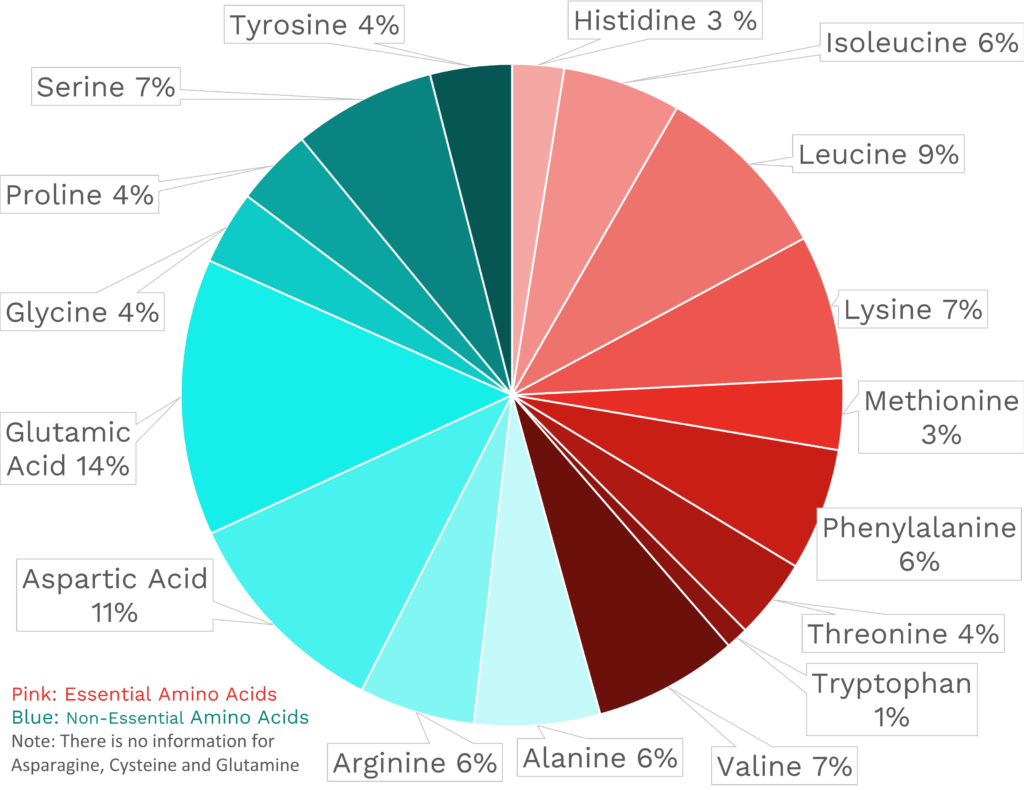

| VITAMINS | ||
|---|---|---|
| Vitamin A | 0.0 μg RAE | 0% DV |
| Vitamin B1 (Thiamin) | 4.0 μg | 0% DV |
| Vitamin B2 (Riboflavin) | 439.0 μg | 34% DV |
| Vitamin B3 (Niacin) | 0.1 mg | 1% DV |
| Vitamin B5 (Pantothenic Acid) | 0.2 mg | 4% DV |
| Vitamin B6 (Pyridoxine) | 5.0 μg | 0% DV |
| Vitamin B7 (Biotin) | 7.8 μg | 26% DV |
| Vitamin B9 (Folate) | 4.0 μg | 1% DV |
| Vitamin B12 (Cobalamin) | 0.1 μg | 4% DV |
| Vitamin C | 0.0 mg | 0% DV |
| Vitamin D (D2 + D3) | 0.0 μg | 0% DV |
| Vitamin E | 0.0 mg | 0% DV |
| Vitamin K | 0.0 μg | 0% DV |
| Choline | 1.1 mg | 0% DV |
| Myo-Inositol | 5.0 mg | ~ |
| CoQ10 | ~ | ~ |
| FUNCTIONAL FATS | ||
|---|---|---|
| MUFA | 0.0 g | 0% DV |
| ALA | 0.0 mg | 0% DV |
| EPA + DHA | 0.0 mg | 0% DV |
| CLA | ~ | ~ |
| Linoleic Acid | 0.0 g | 0% DV |
| MCT’s | 0.0 g | ~ |
| MINERALS | ||
|---|---|---|
| Calcium | 7.0 mg | 1% DV |
| Copper | 23.0 μg | 3% DV |
| Iodine | ~ | ~ |
| Iron | 0.1 mg | 0% DV |
| Magnesium | 11.0 mg | 3% DV |
| Manganese | 11.0 μg | 0% DV |
| Phosphorus | 15.0 mg | 1% DV |
| Potassium | 163.0 mg | 3% DV |
| Selenium | 20.0 μg | 36% DV |
| Sodium | 166.0 mg | 7% DV |
| Zinc | 0.0 mg | 0% DV |
| PHYTONUTRIENTS | ||
|---|---|---|
| Carotenoids | 0.0 μg | ~ |
| Polyphenols | 0.0 mg | ~ |
| Phytosterols | 0.0 mg | ~ |
| Glucosinolates | ~ | ~ |
| Thiosulfinates | ~ | ~ |
| Betalains | ~ | ~ |
| AMINO ACIDS & PEPTIDES | ||
|---|---|---|
| Taurine | ~ | ~ |
| Ergothioneine | 0.0 mg | ~ |
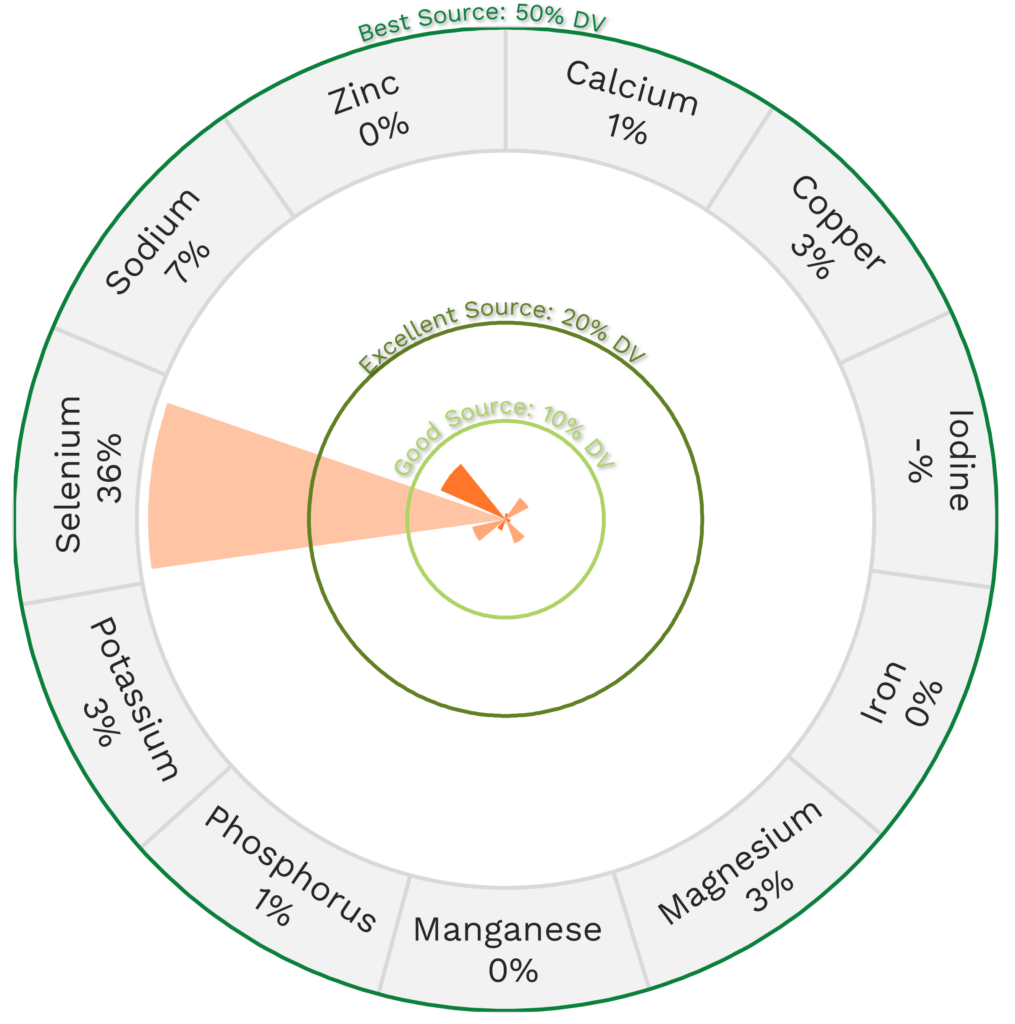
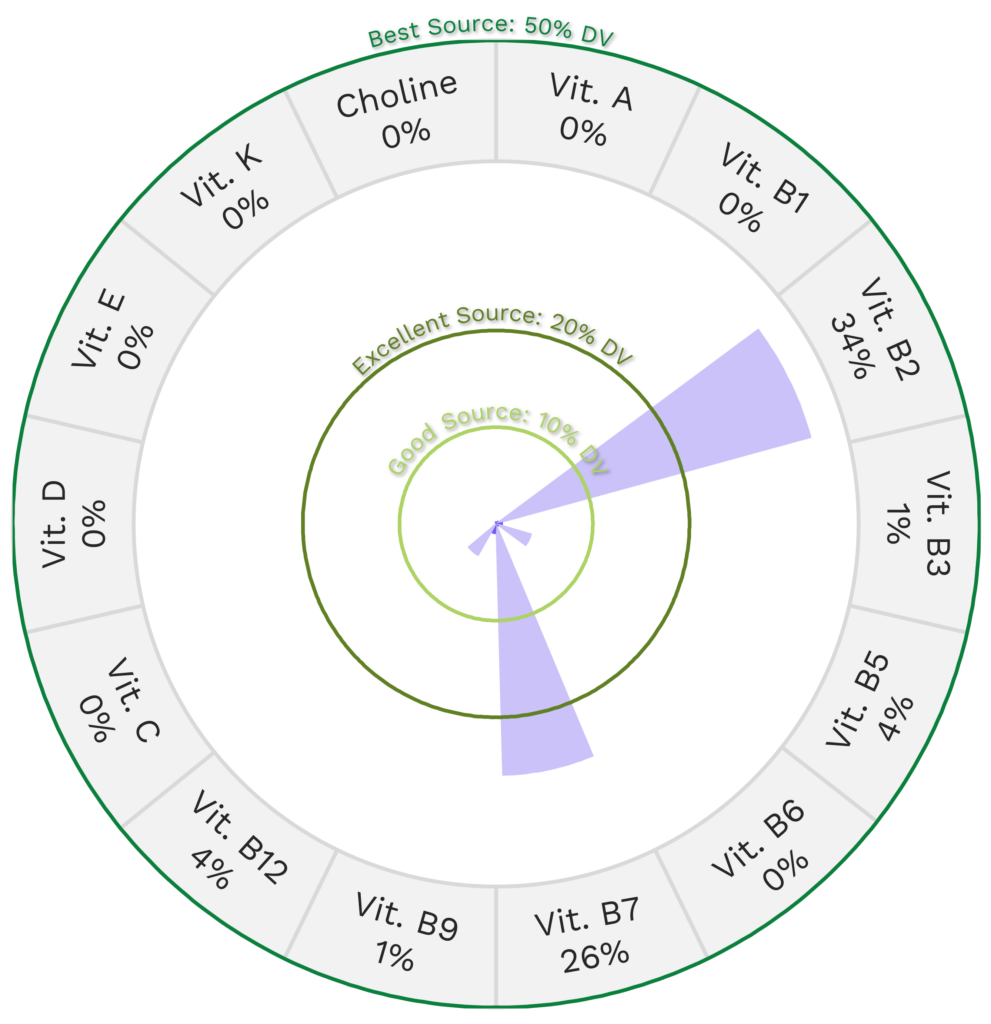
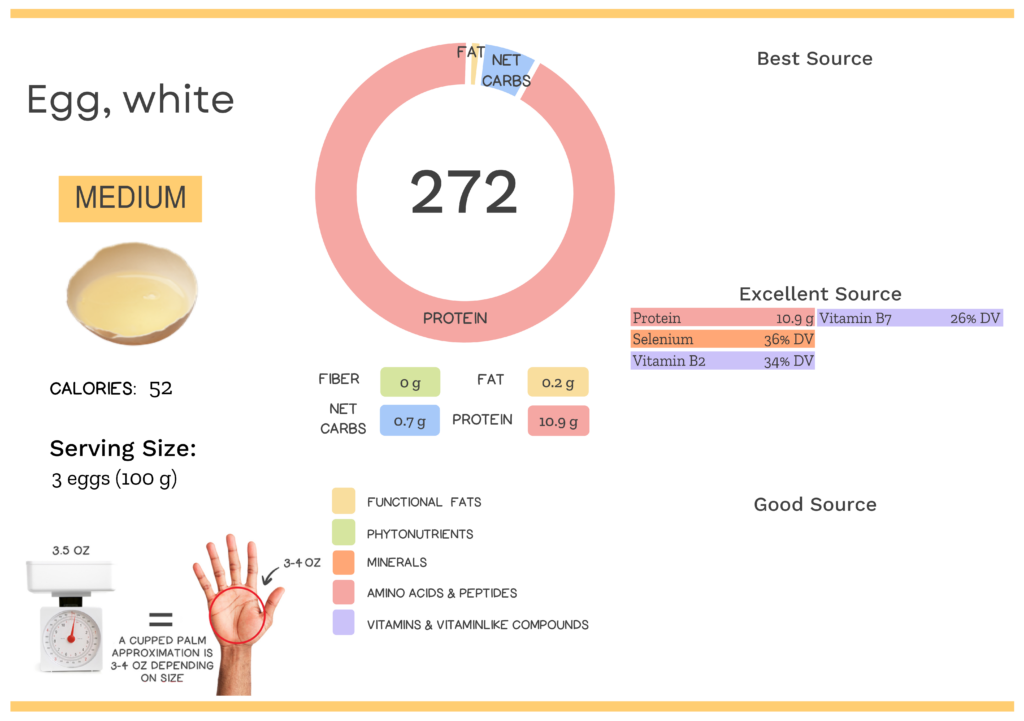
Chicken Egg Nutrition Varies With Component
The Nutrivore Score of chicken eggs varies based on the portion of the egg being consumed, as does the taste! Eggs can be eaten whole, or separated such that the yolk is removed from the egg white. It’s important to note that the vast majority of an egg’s nutrition is found in the yolk.
| NUTRIVORE SCORE | |
|---|---|
| Chicken egg, white, raw | 272 |
| Chicken egg, whole, raw | 355 |
| Chicken egg, yolk, raw | 342 |
Chicken Egg White Nutrition Varies With Processing
The Nutrivore Score of chicken egg whites varies based on how they have been processed. Dried and frozen egg whites are readily available to use in place of fresh egg whites and are conveniently already separated from the egg yolks.
| NUTRIVORE SCORE | |
|---|---|
| Chicken egg, white, dried | 235 |
| Chicken egg, white, frozen, pasteurized | 193 |
| Chicken egg, white, raw | 272 |
Impressed by all the egg-cellent nutrition in egg whites? Maybe your friends will be too!
Health Benefits of Chicken Egg White Nutrients
Let’s take a closer look at all of the best and excellent source of nutrients found in a 100-gram serving of chicken egg whites and see how they benefit our health.
Chicken Egg Whites Provide 36% DV Selenium
Chicken egg whites are an excellent source of selenium, providing 36% of the daily value per 100-gram serving!

Selenium is a trace mineral needed by all mammals to sustain life. It serves as a component of the non-proteinogenic amino acids selenocysteine and selenomethionine, and also helps form over two dozen selenoproteins involved in reproduction, thyroid hormone metabolism, antioxidant defense, DNA synthesis, and immunity. Observational research suggests selenium could play a protective role against cancer, heart disease, asthma, and inflammatory bowel disease, although human trials have generally been lacking or contradictory. There’s also evidence that selenium can play a preventative role in asthma and inflammatory bowel disease, while also reducing mortality in patients with sepsis. Learn more about selenium here.
Chicken Egg Whites Provide 34% DV Vitamin B2 (Riboflavin)
Chicken egg whites are also an excellent source of vitamin B2 (riboflavin), providing 34% of the daily value per 100-gram serving!
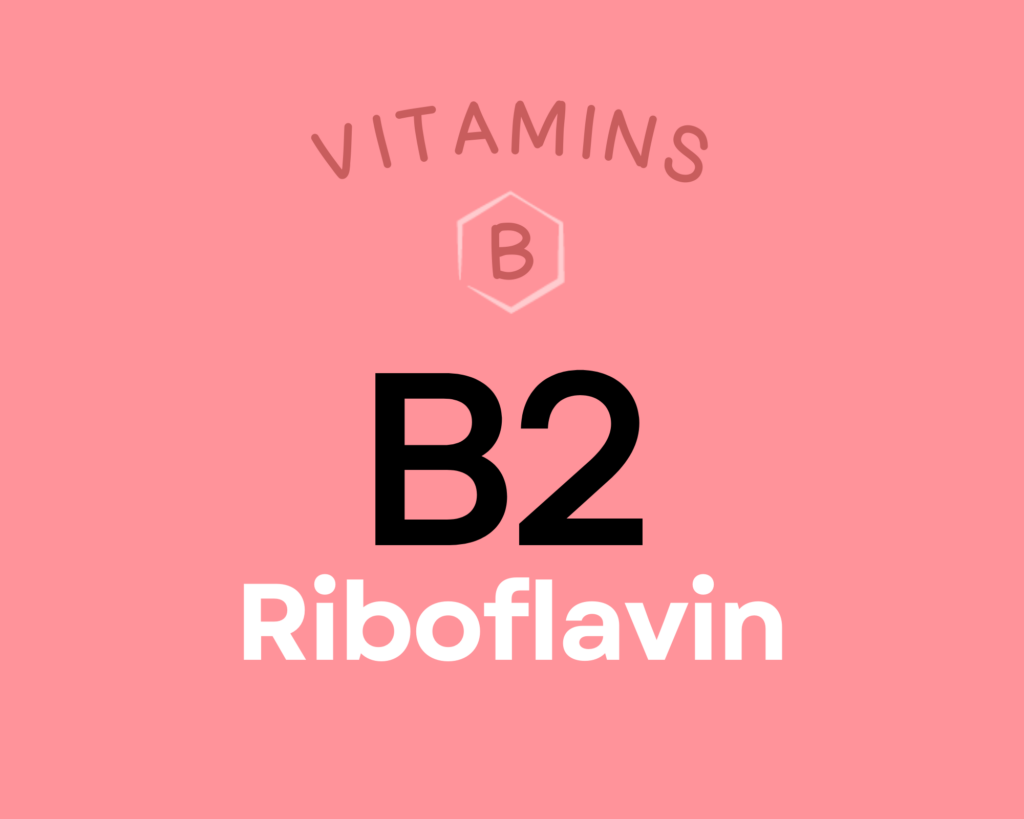
Riboflavin (or vitamin B2) is a vitamin that helps form two important coenzymes involved in oxidation-reduction reactions: flavin mononucleotide (FMN), and flavin adenine dinucleotide (FAD). Collectively, these coenzymes are involved in antibody production, energy production, growth and development, skin and hair health, and the metabolism of several other nutrients (vitamin B6, niacin, folate, and iron). Research suggests a role for riboflavin in preventing or treating migraine headaches, cardiovascular disease, cataracts, and preeclampsia during pregnancy. It also possesses some anti-cancer properties due to its involvement in folate metabolism and MTHFR activity. Learn more about vitamin B2 here.
Chicken Egg Whites Provide 26% DV Vitamin B7 (Biotin)
Chicken egg whites are an excellent source of vitamin B7 (biotin), providing 26% of the daily value per 100-gram serving!
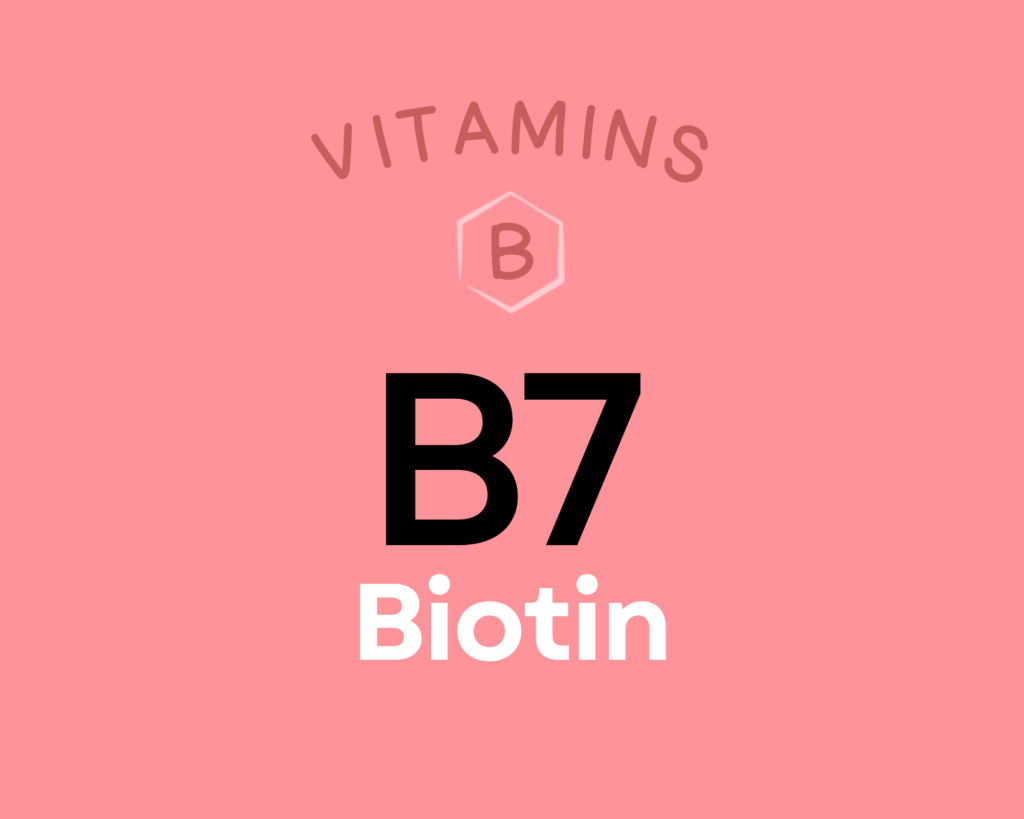
Biotin is a water-soluble B vitamin, also known as vitamin B7. Like other B vitamins, it plays an important role in energy metabolism (serving as a coenzyme for five carboxylase enzymes), neurotransmitter production, cellular function, and the function of various organs. Getting enough biotin can help support healthy nail and hair growth. It’s also particularly important during pregnancy, with low intakes increasing the risk of premature delivery and birth defects. There’s even some evidence biotin can benefit diabetics and reduce functional disabilities in people with multiple sclerosis. Learn more about biotin here.
Chicken Egg Whites Provide 10.9 g of Protein
Chicken egg whites are also an excellent source of protein, providing 10.9 g of protein per 100-gram serving!
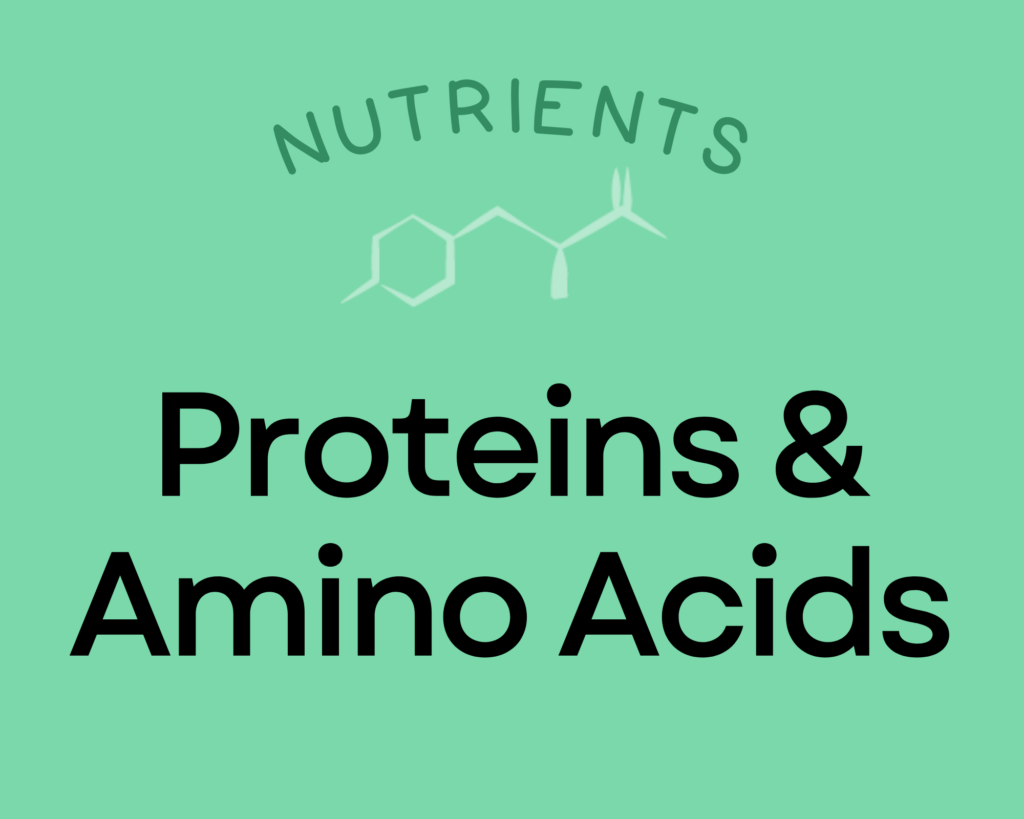
Proteins are the molecules that actually perform most of the various functions of life. In addition to being major structural components of cells and tissues, they have incredibly diverse roles from driving chemical reactions (e.g., enzymes) to signaling (e.g., some types of hormones) to transporting and storing nutrients. Dietary protein is necessary to supply the amino acid building blocks for all of the proteins in our bodies. The recommended daily allowance of protein is 0.36 grams per pound body weight (0.8 grams per kilogram of body weight). That amounts to 56 grams for a 150-pound person. However, it’s important to emphasize that this number is considered a minimum daily allotment, and there is no established upper limit. In fact, many studies have evaluated diets containing three to four times more protein than this minimum and proven benefits to weight management, body composition, hormone regulation, and cardiovascular health. These studies suggest that an optimal protein intake for most people is probably in the range of 1.2 to 1.8 grams per kilogram bodyweight (82 to 122 grams for that same 150-pound person), and that people who are very active may see the best results at even higher intake. Learn more about protein and amino acids here.
Learn What Foods Are the Best Sources of Every Nutrient

The Top 25 Foods for Every Nutrient
The Top 25 Foods for Every Nutrient e-book is a well-organized, easy-to-use, grocery store-friendly guide to help you choose foods that fit your needs of 43 important nutrients while creating a balanced nutrient-dense diet.
Get two “Top 25” food lists for each nutrient, plus you’ll find RDA charts for everyone, informative visuals, fun facts, serving sizes and the 58 foods that are Nutrient Super Stars!
Buy now for instant digital access.
How Many Chicken Egg Whites Should We Eat Per Day?
Eggs are nutrient-dense food sources of highly-digestible complete protein, in addition to being a good source of many other nutrients! (How ‘egg-cellent’ is that?)
Proteins are the molecules that perform most of the various functions of life which is why protein deficiency is detrimental to all of the body’s organs and systems, including impacting function of the brain (especially in infants and young children), immune system, gut barrier, and kidneys. Dietary protein is necessary to supply the amino acid building blocks for all of the proteins in our bodies. Physical signs of protein deficiency include edema (swelling), poor musculature, dull skin, thin and fragile hair, and failure to thrive in infants and children.
The Accepted Macronutrient Distribution Ranges (AMDR) were established by the Food and Nutrition Board of the Institute of Medicine using evidence from interventional trials with support of epidemiological evidence that suggest a role in the prevention or increased risk of chronic diseases, and based on ensuring sufficient intake of essential nutrients. The AMDR for protein is 10% to 35% calories from protein.
The recommended daily allowance of protein is 0.36 grams per pound body weight (0.8 grams per kilogram of body weight). That amounts to 56 grams for a 150-pound person. However, it’s important to emphasize that this number is considered a minimum daily allotment, and there is no established upper limit. In fact, many studies have evaluated diets containing three to four times more protein than this minimum and proven benefits to weight management, body composition, hormone regulation, and cardiovascular health. These studies suggest that an optimal protein intake for most people is probably in the range of 1.2 to 1.8 grams per kilogram bodyweight (82 to 122 grams for that same 150-pound person), and that people who are very active may see the best results at even higher intake. Learn more about protein here.
Eggs are one of the most hotly debated animal foods in terms of their health effects because, for decades, research has given us conflicting results on the association between eggs and heart disease, stroke, diabetes, cancer, and other health outcomes. However, the risk of harm purported in the media is not supported by the scientific literature and overall, eggs are nutrient-dense sources of complete protein.
Easily track your servings of Nutrivore Foundational Foods!
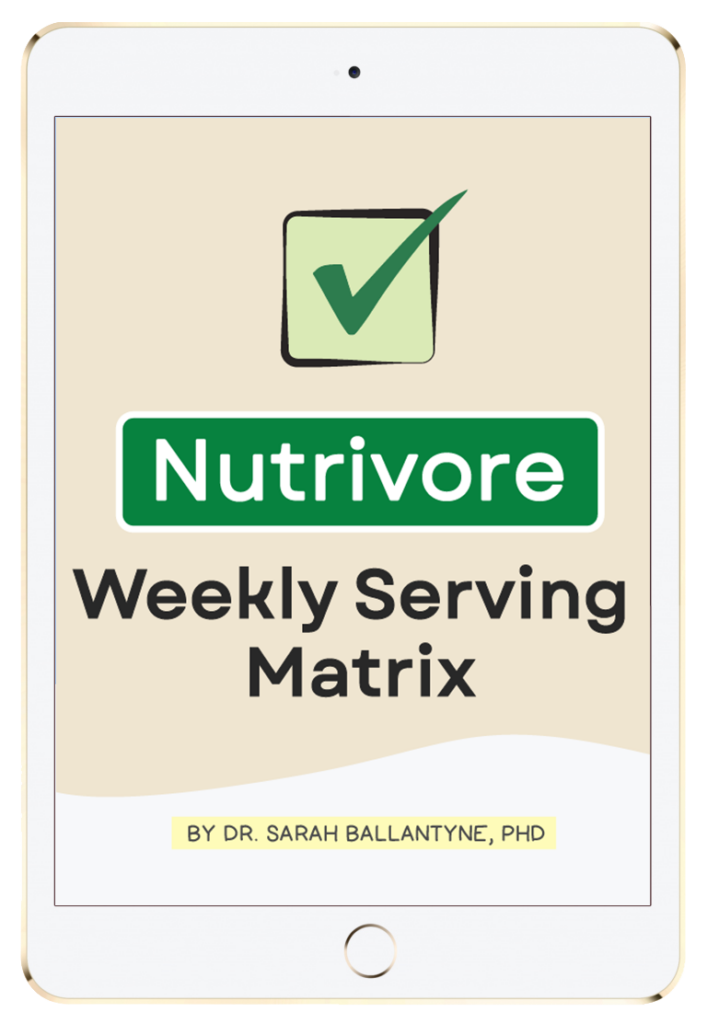
The Nutrivore Weekly Serving Matrix
The Nutrivore Weekly Serving Matrix digital resource is an easy-to-use and flexible weekly checklist designed to help you maximize nutrient-density and meet serving suggestions of Nutrivore foundational foods, all without having to weigh or measure your foods!
Includes a 22-page instructional guide and downloadable interactive guides.
Buy now for instant digital access.
cITATIONS
Expand to see all scientific references for this article.
Clements RS Jr, Darnell B. Myo-inositol content of common foods: development of a high-myo-inositol diet. Am J Clin Nutr. 1980 Sep;33(9):1954-67. doi: 10.1093/ajcn/33.9.1954. PMID: 7416064.
Ey J, Schömig E, Taubert D. Dietary sources and antioxidant effects of ergothioneine. J Agric Food Chem. 2007 Aug 8;55(16):6466-74. doi: 10.1021/jf071328f. Epub 2007 Jul 6. PMID: 17616140.
Fineli Finnish Food Composition Database: Egg White, 66% of Egg Mass
USDA Food Central Database: Egg, white, raw, fresh
Watanabe T, Kioka M, Fukushima A, Morimoto M, Sawamura H. Biotin content table of select foods and biotin intake in Japanese. Int J Anal Bio-Sci. 2014. Vol 2(4):109-125.


